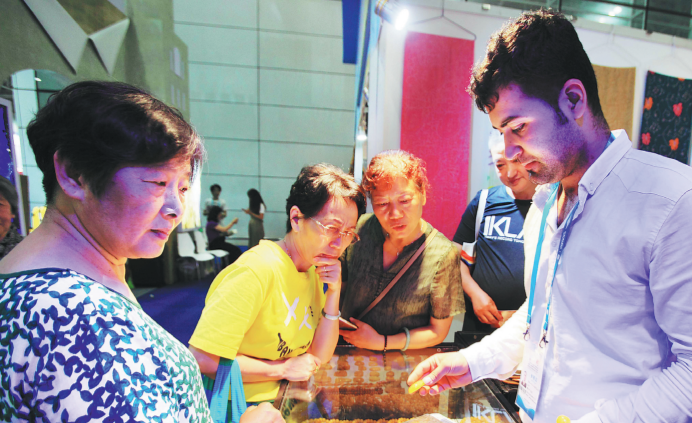Netherlands' trade gets boost from Belt and Road Initiative


Partnership expected to result in growth of agriculture, energy and urbanization sectors
China and the Netherlands - two strong supporters of economic globalization - will create more jobs, two-way trade and investment opportunities in the next stage of partnership boosted by tangible growth of the Belt and Road Initiative, according to officials and business leaders.
"Backed by strong political and business ties, both sides have more space to expand trade and investment, and deepen cooperation in such fields as modern agriculture, energy preservation, environmental protection and urbanization in the long term," said Feng Yaoxiang, director of the investment promotion division at the China Council for the Promotion of International Trade.
Eager to expand trade between both sides, China and the Netherlands agreed in 2014 to build a comprehensive partnership that stresses openness and pragmatism.
Bilateral trade grew by 8.6 percent year-on-year to $85.18 billion in 2018. Within the European Union, the Netherlands remained China's second-largest trade partner after Germany, data from the General Administration of Customs show.
China mainly exports manufacturing equipment, port cranes, steel, wind power products, electronics, textiles, garments and household appliances to the Netherlands.
In addition to dairy and other agricultural products, water treatment, chemical and pharmaceutical goods, the Netherlands' exports to China include machinery, fossil fuels and tobacco.
Xue Rongjiu, deputy director of the Beijing-based China Society for WTO Studies, said China will continue to export consumer goods in exchange for the Netherlands' high-tech products, as well as food products and environmental protection and improvement technologies.
"Most of their imports are complementary. Surely, it isn't direct competition," he said.
As Chinese consumers increasingly demand a wider range of high-quality food and beverages, Dutch dairy giant Royal FrieslandCampina, a global dairy brand based in the Netherlands, plans to bring a wider range of products to China.
Rahul Colaco, president of FrieslandCampina China, said consumers in China are very demanding, and the generation gap among consumers is becoming smaller. More consumers are willing to pay for premium and innovative dairy products.
To bolster the growing trade between the two countries, several Chinese cities such as Nanchang, Yiwu and Chengdu have all operated regular freight trains to Rotterdam in the Netherlands since 2015.
"As staunch supporters of the open economy and economic globalization, the Netherlands and China share more interests in jointly tackling global challenges such as logistics connectivity and technology development," said Tu Xinquan, a professor of international trade at the University of International Business and Economics in Beijing.
He said although trade protectionism seems to be on the rise and European integration is suffering setbacks, China and the Netherlands share a common stance on many major issues. Both countries agree on economic globalization and multilateralism, an opposition to protectionism and a commitment to the Paris Climate Agreement.
Tu said the Belt and Road Initiative has been beneficial for both countries.
Eager to further deepen and widen their cooperation, the two countries agreed in February last year to carry out more mutually beneficial cooperation through joint implementation of the Belt and Road Initiative. The agreement was reached during Dutch King Willem-Alexander's visit to Beijing.
China and the Netherlands are both growing economically, increasing the connectivity of their regional infrastructure, improving people-to-people exchanges and boosting investment and trade on a multilateral cooperative platform, said Xu Hongcai, an economist with the China Center for International Economic Exchanges.
Supported by the tangible growth of the BRI, Xu said many markets are seeing surging demand to improve their infrastructure with next-generation projects, and those projects are set to benefit Dutch and Chinese companies across industries.
































